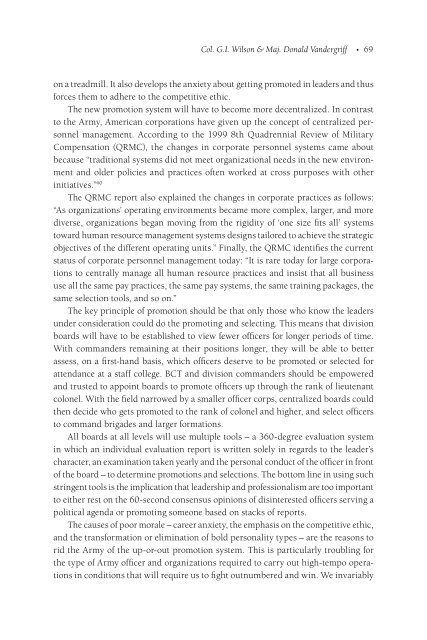Americas Defense Meltdown - IT Acquisition Advisory Council
Americas Defense Meltdown - IT Acquisition Advisory Council
Americas Defense Meltdown - IT Acquisition Advisory Council
You also want an ePaper? Increase the reach of your titles
YUMPU automatically turns print PDFs into web optimized ePapers that Google loves.
Col. G.I. Wilson & Maj. Donald Vandergriff • 69on a treadmill. It also develops the anxiety about getting promoted in leaders and thusforces them to adhere to the competitive ethic.The new promotion system will have to become more decentralized. In contrastto the Army, American corporations have given up the concept of centralized personnelmanagement. According to the 1999 8th Quadrennial Review of MilitaryCompensation (QRMC), the changes in corporate personnel systems came aboutbecause “traditional systems did not meet organizational needs in the new environmentand older policies and practices often worked at cross purposes with otherinitiatives.” 40The QRMC report also explained the changes in corporate practices as follows:“As organizations’ operating environments became more complex, larger, and morediverse, organizations began moving from the rigidity of ‘one size fits all’ systemstoward human resource management systems designs tailored to achieve the strategicobjectives of the different operating units.” Finally, the QRMC identifies the currentstatus of corporate personnel management today: “It is rare today for large corporationsto centrally manage all human resource practices and insist that all businessuse all the same pay practices, the same pay systems, the same training packages, thesame selection tools, and so on.”The key principle of promotion should be that only those who know the leadersunder consideration could do the promoting and selecting. This means that divisionboards will have to be established to view fewer officers for longer periods of time.With commanders remaining at their positions longer, they will be able to betterassess, on a first-hand basis, which officers deserve to be promoted or selected forattendance at a staff college. BCT and division commanders should be empoweredand trusted to appoint boards to promote officers up through the rank of lieutenantcolonel. With the field narrowed by a smaller officer corps, centralized boards couldthen decide who gets promoted to the rank of colonel and higher, and select officersto command brigades and larger formations.All boards at all levels will use multiple tools – a 360-degree evaluation systemin which an individual evaluation report is written solely in regards to the leader’scharacter, an examination taken yearly and the personal conduct of the officer in frontof the board – to determine promotions and selections. The bottom line in using suchstringent tools is the implication that leadership and professionalism are too importantto either rest on the 60-second consensus opinions of disinterested officers serving apolitical agenda or promoting someone based on stacks of reports.The causes of poor morale – career anxiety, the emphasis on the competitive ethic,and the transformation or elimination of bold personality types – are the reasons torid the Army of the up-or-out promotion system. This is particularly troubling forthe type of Army officer and organizations required to carry out high-tempo operationsin conditions that will require us to fight outnumbered and win. We invariably


